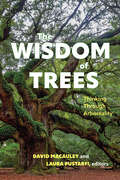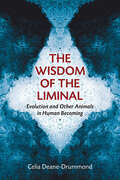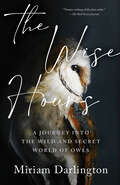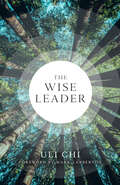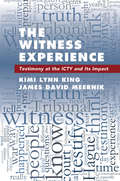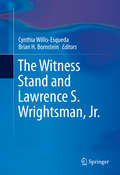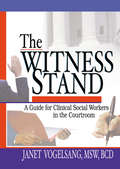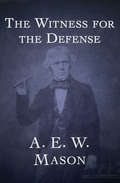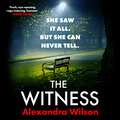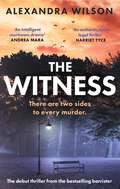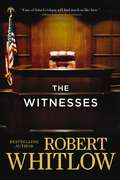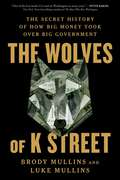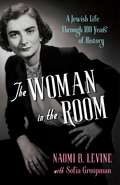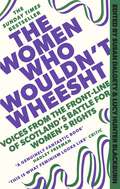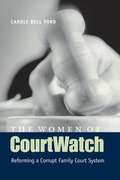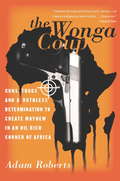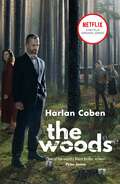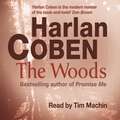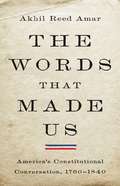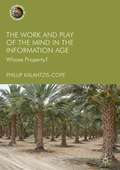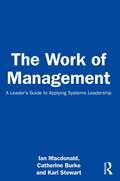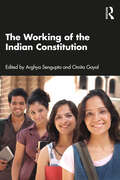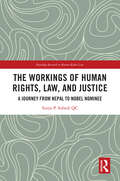- Table View
- List View
The Wisdom of Trees: Thinking Through Arboreality (SUNY series in Environmental Philosophy and Ethics)
by David Macauley; Laura PustarfiPioneering essays that reveal the significance of new interdisciplinary understandings of trees and forests, especially in terms of their philosophical and ecological dimensions and their importance for addressing the climate emergency.This is the first book to apply philosophical thinking to trees. Through a series of sixteen diverse essays by leading scholars and writers, along with an in-depth introduction to the key issues and ideas, it examines the new and emerging understanding of trees in science and society. Contributors show how these developments encourage a revisioning of philosophical thought and a more sustainable relationship with trees and forests-a reconceptualization with important ecological and social implications for responding to deforestation, the loss of biodiversity, and the climate emergency. The interdisciplinary contributions in this collection investigate the many interconnected dimensions of arboreality, focusing on subjects related to time, mind, truth, memory, being, beauty, goodness, silence, wisdom, personhood, and death. The volume engages in a conversation about why trees matter, how they can best be protected, our obligations to them, and even what or who they are. Most of the chapters are informed by natural history or ecological science and many share a particular emphasis on continental philosophy and the environmental humanities.
The Wisdom of the Liminal: Evolution and Other Animals in Human Becoming
by Celia Deane-DrummondA sophisticated theological anthropology that takes into account evolutionary theories and our relationships to other animals In this book Celia Deane-Drummond charts a new direction for theological anthropology in light of what is now known about the evolutionary trajectories of humans and other animals. She presents a case for human beings becoming fully themselves through their encounter with God, after the pattern of Christ, but also through their relationships with each other and with other animals. Drawing on classical sources, particularly the work of Thomas Aquinas, Deane-Drummond explores various facets of humans and other animals in terms of reason, freedom, language, and community. In probing and questioning how human distinctiveness has been defined using philosophical tools, she engages with a range of scientific disciplines, including evolutionary biology, biological anthropology, animal behavior, ethology, and cognitive psychology. The result is a novel, deeply nuanced interpretation of what it means to be distinctively human in the image of God.
The Wise Hours: A Journey Into The Wild And Secret World Of Owls
by Miriam DarlingtonPeople Pick of the Week “Unfailingly precise and lovingly poetic. . . . Nature writing of the first order.” —The Wall Street Journal “A beautiful book; wise and sharp-eared as its subject.” —Robert Macfarlane One minute I was sipping my tea by the window. There was nothing but the palest edge of grey light and a wisp of steam from my cup—and then a shadow swooped out of the air. With the lightest of scratches, as if the dawn light was solidifying into life, there it was, perched like an exclamation mark on the balcony: an owl, come to my home. Owls have existed for over sixty million years, and in the relatively short time we have shared the planet with these majestic birds they have ignited the human imagination. But even as owls continue to captivate our collective consciousness, celebrated British nature writer Miriam Darlington finds herself struck by all she doesn’t know about the true nature of these enigmatic creatures. Darlington begins her fieldwork in the British Isles with her teenage son, Benji. As her avian fascination grows, she travels to France, Serbia, Spain, Finland, and the frosted Lapland borders of the Arctic for rare encounters with the Barn Owl, Tawny Owl, Long-eared Owl, Pygmy Owl, Snowy Owl, and more. But when her son develops a mysterious illness, her quest to understand the elusive nature of owls becomes entangled with her search for finding a cure. In The Wise Hours, Darlington watches and listens to the natural world and to the rhythms of her home and family, inviting readers to discover the wonders of owls alongside her while rewilding our imagination with the mystery, fragility, and magnificence of all creatures.
The Wise Leader
by Uli ChiLeading and mentoring begins with wisdom. Though we are overwhelmed with information, we often struggle to find true wisdom. Yet those leading or mentoring others, whether in business or in spiritual life, must rely on wisdom&’s guidance to lead with purpose and meaning. With decades of leadership experience in business, nonprofits, and Christian higher education, Uli Chi helps readers build this foundational virtue. Looking to Scripture as well as art and literature, Chi illuminates the nature of wisdom as fundamentally relational and other-centered. In the context of leadership, biblical wisdom shows us the importance of wielding power with humility. Chi also provides a framework for the formation of character and vision in the lifelong journey of gaining wisdom. Full of substantive and practical reflections, The Wise Leader both forms young leaders and teaches experienced leaders how to pass on the torch meaningfully.
The Witness Experience: Testimony at the ICTY and Its Impact
by King Kimi Lynn Meernik James DavidThis book provides the most comprehensive and scientific assessment to date of what it means to appear before war crimes tribunals. This ground-breaking analysis, conducted with the cooperation of the International Criminal Tribunal for the former Yugoslavia (ICTY) Victims and Witnesses Section, examines the positive and negative impact that testifying has on those who bear witness to the horrors of war by shedding new light on the process. While most witnesses have positive feelings and believe they contributed to international justice, there is a small but critical segment of witnesses whose security, health, and well-being are adversely affected after testifying. The witness experience is examined holistically, including witness' perceptions of their physical and psychological well-being. Because identity (gender and ethnicity) and war trauma were central to the ICTY's mandate and the conflicts in the former Yugoslavia, the research explores in-depth how they have impacted the most critical stakeholders of any transitional justice mechanism: the witnesses.
The Witness Stand and Lawrence S. Wrightsman, Jr.
by Brian H. Bornstein Cynthia Willis-EsquedaThis unique volume salutes the work of pioneering forensic psychologist Lawrence S. Wrightsman, Jr. , by presenting current theorizing and research findings on issues that define the field of psychology and law. Ongoing topics in witness behaviors, suspect identification, and juror decision making illustrate how psychology and law complement and also conflict at various stages in legal processes. The book also sheds light on evolving areas such as DNA exonerations, professional trial consulting, and jury selection strategies, and the distinct challenges and opportunities these issues present. Noted contributors to the book include Wrightsman himself, who offers salient observations on the field that he continues to inspire. Featured among the topics: The credibility of witnesses. Psychological science on eyewitness identification and the U. S. Supreme Court. False confessions, from colonial Salem to today. Identifying juror bias: toward a new generation of jury selection research. Law and social science: how interdisciplinary is interdisciplinary enough? Race and its place in the American legal system. With its diverse mix of perspectives and methodologies, The Witness Stand and Lawrence S. Wrightsman, Jr. will interest forensic researchers in academic and applied settings, as well as individuals working in the legal system, such as attorneys, judges and law enforcement personnel.
The Witness Stand: A Guide for Clinical Social Workers in the Courtroom
by Carlton Munson Janet VogelsangLearn reliable techniques to prepare and present effective testimony!“Soon after leaving graduate school I was thrown to the courtroom wolves with no preparation. No social worker should have to go through that,” says Janet Vogelsang, author of The Witness Stand. Few colleges of social work prepare their students for the inevitable involvement with the courts entailed by their profession. This timely book provides you with a blueprint for presenting yourself as a competent and credible professional in court cases. This indispensable guide tells exactly what happens in court, how to counter common strategies for discrediting your profession, and what to do when your client's attorney is obnoxious. The Witness Stand emphasizes the biopsychosocial assessment as the essential tool for a social worker called on to testify in court. Its helpful features include sample forms and affidavits and actual court testimony. The end-of-chapter summaries can be used for rapid review and as a ”to do” checklist for preparing a court case.The Witness Stand offers practical, detailed advice on such matters as: how the legal system works how to handle contacts with attorneys and investigators what to do with documents and files how to prepare your testimony how to handle direct testimony and cross-examination how to define your social work expertise on the stand what to wear when you go to courtThe Witness Stand can help you deal with the anxiety-provoking complexities of the legal system. Instead of being confused or intimidated by legal arcana, you will be well-prepared, well-organized, and ready to present yourself as the confident, reliable professional you are.
The Witness for the Defense
by A. E. MasonA British barrister takes the witness stand after becoming embroiled in a shocking murder in colonial India Unassured of a family inheritance, Henry Thresk dedicates himself to pursuing a career in law. His determination is exacting; as a man of limited means, it has to be. Even when he meets Stella, a supremely appealing young woman, he refuses to consider love and marriage. He must stick to the path he has laid out for himself. Eight years later, on a solicitor call to Bombay, Henry finds himself face to face with a photograph of his long-lost love. Stella is married to Captain Ballantyne, an older man clever at politics and languages who is revealed to be a violent brute. Henry is determined to rescue Stella, but before he can enact a plan the captain is discovered shot to death with his wife&’s rifle. Henry, a respected man of the law, is called as a witness for the defense—only the first of many twists in this deftly plotted mystery. If his instincts are wrong, he will sacrifice his life and career for a woman he hardly knows. This ebook has been professionally proofread to ensure accuracy and readability on all devices.
The Witness: The most authentic, twisty legal thriller, from the barrister author of In Black and White
by Alexandra Wilson'An intelligent and immersive courtroom drama, a compelling new voice in legal crime fiction' ANDREA MARASHE SAW IT ALLBUT SHE CAN NEVER TELLA young black man is arrested for murder. The case against him is strong - a mum and a teacher saw him standing over a body in a park, a knife still in hand.But his up-and-coming barrister Rosa knows how people prejudge, but most of all, she suspects something is amiss. This boy comes from her neighbourhood. From a good family. So she begins to dig...As Rosa discovers secret upon terrible secret, she moves closer to finding a testimony that could win the case - or bring the whole establishment down on her.The Witness isthe start of a groundbreaking new series by young barrister and bestselling author of In Black and White, Alexandra Wilson.'This is exactly what it's like to be a criminal barrister at the sharp end of Legal Aid work, and an important corrective to the cliché that all barristers are posh, white and loaded. An authentic, tense legal thriller from an author who knows what she's talking about'Harriet Tyce'Her striking debut shows she is expert at using the form to highlight aspects of everyday ethnic minority experience: the drip-drip of countless micro-aggressions, and Rosa's daunting disadvantages when facing white middle-class opponents in court'Sunday Times'A gripping insight into the intricacies of the British legal system and the assumptions that are made. The Witness is a compelling story, told by an original new voice, with a breathtaking conclusion'Robert Gold'A powerful and authentic legal thriller . . . a tense, twisty read that highlights just how frightening the legal and penal system can be when your future depends upon who the jury believes'Jo Callaghan'Fresh, eye-opening, rage-inducing, humane. A coruscating indictment of a legal system held together by Gaffer tape and bias'Tamar Cohen'Alexandra Wilson's tense and very twisty crime thriller is a powerful page-turner about the importance of family, the burden of guilt, and the racism that pervades our legal systems. A superb and timely debut!'Ashley Tate'A twisty courtoom thriller that is destined to become a TV drama'i Paper
The Witness: The most authentic, twisty legal thriller, from the barrister author of In Black and White
by Alexandra Wilson'An intelligent and immersive courtroom drama, a compelling new voice in legal crime fiction' ANDREA MARASHE SAW IT ALLBUT SHE CAN NEVER TELLA young black man is arrested for murder. The case against him is strong - a mum and a teacher saw him standing over a body in a park, a knife still in hand.But his up-and-coming barrister Rosa knows how people prejudge, but most of all, she suspects something is amiss. This boy comes from her neighbourhood. From a good family. So she begins to dig...As Rosa discovers secret upon terrible secret, she moves closer to finding a testimony that could win the case - or bring the whole establishment down on her.The Witness isthe start of a groundbreaking new series by young barrister and bestselling author of In Black and White, Alexandra Wilson.'This is exactly what it's like to be a criminal barrister at the sharp end of Legal Aid work, and an important corrective to the cliché that all barristers are posh, white and loaded. An authentic, tense legal thriller from an author who knows what she's talking about'Harriet Tyce'Her striking debut shows she is expert at using the form to highlight aspects of everyday ethnic minority experience: the drip-drip of countless micro-aggressions, and Rosa's daunting disadvantages when facing white middle-class opponents in court'Sunday Times'A gripping insight into the intricacies of the British legal system and the assumptions that are made. The Witness is a compelling story, told by an original new voice, with a breathtaking conclusion'Robert Gold'A powerful and authentic legal thriller . . . a tense, twisty read that highlights just how frightening the legal and penal system can be when your future depends upon who the jury believes'Jo Callaghan'Fresh, eye-opening, rage-inducing, humane. A coruscating indictment of a legal system held together by Gaffer tape and bias'Tamar Cohen'Alexandra Wilson's tense and very twisty crime thriller is a powerful page-turner about the importance of family, the burden of guilt, and the racism that pervades our legal systems. A superb and timely debut!'Ashley Tate'A twisty courtoom thriller that is destined to become a TV drama'i Paper
The Witness: The most authentic, twisty legal thriller, from the barrister author of In Black and White
by Alexandra Wilson'An intelligent and immersive courtroom drama, a compelling new voice in legal crime fiction' ANDREA MARASHE SAW IT ALLBUT SHE CAN NEVER TELLA young black man is arrested for murder. The case against him is strong - a mum and a teacher saw him standing over a body in a park, a knife still in hand.But his up-and-coming barrister Rosa knows how people prejudge, but most of all, she suspects something is amiss. This boy comes from her neighbourhood. From a good family. So she begins to dig...As Rosa discovers secret upon terrible secret, she moves closer to finding a testimony that could win the case - or bring the whole establishment down on her.The Witness isthe start of a groundbreaking new series by young barrister and bestselling author of In Black and White, Alexandra Wilson.'This is exactly what it's like to be a criminal barrister at the sharp end of Legal Aid work, and an important corrective to the cliché that all barristers are posh, white and loaded. An authentic, tense legal thriller from an author who knows what she's talking about'Harriet Tyce'Her striking debut shows she is expert at using the form to highlight aspects of everyday ethnic minority experience: the drip-drip of countless micro-aggressions, and Rosa's daunting disadvantages when facing white middle-class opponents in court'Sunday Times'A gripping insight into the intricacies of the British legal system and the assumptions that are made. The Witness is a compelling story, told by an original new voice, with a breathtaking conclusion'Robert Gold'A powerful and authentic legal thriller . . . a tense, twisty read that highlights just how frightening the legal and penal system can be when your future depends upon who the jury believes'Jo Callaghan'Fresh, eye-opening, rage-inducing, humane. A coruscating indictment of a legal system held together by Gaffer tape and bias'Tamar Cohen'Alexandra Wilson's tense and very twisty crime thriller is a powerful page-turner about the importance of family, the burden of guilt, and the racism that pervades our legal systems. A superb and timely debut!'Ashley Tate'A twisty courtoom thriller that is destined to become a TV drama'i Paper
The Witnesses
by Robert WhitlowYoung lawyer Parker House is on the rise--until his grandfather's mysterious past puts both of their lives in danger. Parker House's secret inheritance is either his greatest blessing . . . or his deadliest curse. The fresh-faced North Carolina attorney shares his German grandfather's uncanny ability to see future events in his mind's eye--a gift that has haunted 82-year-old Frank House through decades of trying to erase a murderous wartime past. While Parker navigates the intrigue and politics of small-town courtroom law, Frank is forced to face his darkest regrets. Then, a big career break for Parker collides with a new love he longs to nurture and the nightmares his grandfather can no longer escape. Sudden peril threatens to shatter not only Parker's legal prospects but also his life and the lives of those dearest to him. Two witnesses, two paths, an uncertain future.
The Wolves of K Street: The Secret History of How Big Money Took Over Big Government
by Brody Mullins Luke MullinsA dazzling and infuriating portrait of fifty years of corporate influence in Washington, The Wolves of K Street is a &“not-so-guilty pleasure&” (The New York Times): irresistibly dramatic, spectacularly timely, explosive in its revelations, and impossible to put down.In the 1970s, Washington&’s center of power began to shift away from elected officials in big marble buildings to a handful of savvy, handsomely paid operators who didn&’t answer to any fixed constituency. The cigar-chomping son of an influential congressman, an illustrious political fixer with a weakness for modern art, a Watergate-era dirty trickster, the city&’s favorite cocktail party host—these were the sort of men who now ran Washington. Over four decades, they&’d chart new ways to turn their clients&’ cash into political leverage, abandoning favor-trading in smoke-filled rooms for increasingly sophisticated tactics, such as &“shadow lobbying,&” where underground campaigns sparked seemingly organic public outcries to pressure lawmakers into taking actions that would ultimately benefit corporate interests rather than ordinary citizens. With billions of dollars at play, these lobbying dynasties enshrined in Washington a pro-business consensus that would guide the country&’s political leaders—Democrats and Republicans alike. A good lobbyist could ghostwrite a bill or even secretly kill a piece of legislation supported by the president, both houses of Congress, and a majority of Americans. Yet nothing lasts forever. Amid a populist backlash to the soaring inequality these influence peddlers helped usher in, DC&’s pro-business alliance suddenly began to fray. And while the lobbying establishment would continue to invent new ways to influence Washington, the men who&’d built K Street would soon find themselves under legal scrutiny, on the verge of financial collapse or worse. One would turn up dead behind the eighteenth green of an exclusive golf club, with a $1,500 bottle of wine at his feed and bullet in his head. An &“absorbing&” (The Atlantic), &“engrossing&” and &“meticulously researched&” tale (The Guardian)—brought to life with &“novelistic detail&” and &“considerable narrative skill&” (The New York Times)—The Wolves of K Street is essential reading for anyone looking to understand how corporate interests are undermining American democracy.
The Woman in the Room: A Jewish Life Through 100 Years of History
by Naomi B. Levine Sofia GroopmanBorn into a poor, immigrant family, Naomi B. Levine grew up in the Bronx and on Manhattan’s storied Lower East Side in an era when women were not encouraged to have lives of their own. Nevertheless, she managed to raise herself to prominence as a leader of Jewish affairs, champion of civil rights, and expert fundraiser.Poignant, direct, and inflected with Yiddishkeit, The Woman in the Room is the story of how Levine went from living in a crowded tenement with a shared bathroom to penning an amicus brief that was crucial in Brown v. Board of Education, assuming the Executive Directorship of the American Jewish Congress, and saving NYU from bankruptcy with the first billion-dollar capital campaign for a university.A lover of history, Levine describes not just her life but also articulates how the major historical events of the time emboldened her to take social and political positions that were in many circles unacceptable. She was an activist and a feminist before those concepts became part of our everyday parlance. The Woman in the Room not only illuminates the decades Levine lived but furnishes future generations with the strength and courage to face the challenges before them.
The Women Who Wouldn't Wheesht
by Susan Dalgety Lucy Hunter BlackburnTHE SUNDAY TIMES BESTSELLEROn the 25th anniversary of the Scottish Parliament, this book captures an important moment in contemporary history: how a grassroots women's movement, harking back to the suffragettes and second wave feminists of the 1970s and 1980s, took on the political establishment - and changed the course of history.Through a collection of over thirty essays and photographs, some of the women involved tell the story of the five-year campaign to protect women's sex-based rights. Author J.K. Rowling explains why she used her global reach to stand up for women. Leading SNP MP Joanna Cherry writes of how she risked her political career for her beliefs. Survivors of male violence who MSPs refused to meet are given the voice they were denied at Holyrood. Ash Regan MSP recounts what it was like to become the first government minister to resign on a question of principle since the SNP came to power in 2007. Former prison governor Rhona Hotchkiss charts how changes in prison policy in Scotland led to the controversy over Isla Bryson.It is the story of women who risked their job, reputation, even the bonds of family and friendship, to make their voices heard, and ended up - unexpectedly - contributing to the downfall of Nicola Sturgeon, Scotland's first woman first minister.Above all, it is the story of the women who wouldn't wheesht.
The Women of CourtWatch: Reforming a Corrupt Family Court System
by Carole Bell FordHouston was a terrible place to divorce or seek child custody in the 1980s and early 1990s. Family court judges routinely rendered verdicts that damaged the interests of women and children. In some especially shocking cases, they even granted custody to fathers who had been accused of molesting their own children. Yet despite persistent allegations of cronyism, incompetence, sexism, racism, bribery, and fraud, the judges wielded such political power and influence that removing them seemed all but impossible. The family court system was clearly broken, but there appeared to be no way to fix it.
The Wonga Coup: Guns, Thugs, and a Ruthless Determination to Create Mayhem in an Oil-Rich Corner of Africa
by Adam RobertsEquatorial Guinea is a tiny country roughly the size of the state of Maryland. Humid, jungle covered, and rife with unpleasant diseases, natives call it Devil Island. Its president in 2004, Obiang Nguema, had been accused of cannibalism, belief in witchcraft, mass murder, billiondollar corruption, and general rule by terror. With so little to recommend it, why in March 2004 was Equatorial Guinea the target of a group of salty British, South African and Zimbabwean mercenaries, travelling on an American-registered ex-National Guard plane specially adapted for military purposes, that was originally flown to Africa by American pilots? The real motive lay deep below the ocean floor: oil. In The Dogs of War, Frederick Forsyth effectively described an attempt by mercenaries to overthrow the government of Equatorial Guinea - in 1972. And the chain of events surrounding the night of March 7, 2004, is a rare case of life imitating art-or, at least, life imitating a 1970s thriller-in almost uncanny detail. With a cast of characters worthy of a remake of Wild Geese and a plot as mazy as it was unlikely, The Wonga Coup is a tale of venality, overarching vanity and greed whose example speaks to the problems of the entire African continent.
The Woods: A gripping thriller from the #1 bestselling creator of hit Netflix show Fool Me Once
by Harlan CobenNOW A NETFLIX ORIGINAL SERIES! The bestselling author and creator of the hit Netflix drama Fool Me Once takes readers into the heart of a family in this twisty page-turner that proves the darkest secrets are often closest to home.Twenty years ago, four teenagers disappeared in the woods. Now, two decades later, everything is changing... Paul Copeland's sister went missing 20 years ago. Now raising a daughter alone, Cope balances family life with a career as a prosecutor. But when a murder victim is found with evidence linking him to Cope, the well-buried secrets of the past are threatening everything. Is this body one of the campers who disappeared with his sister? Could his sister be alive...? Confronting his past, Cope must decide what is better left hidden in the dark and what truths can be brought to light...
The Woods: NOW A NETFLIX ORIGINAL SERIES
by Harlan CobenPaul Copeland's sister went missing 20 years ago. Now raising a daughter alone, Cope balances family life with a career as a prosecutor. But when a homicide victim is found with evidence linking him to Cope, the well-buried secrets of the past are threatening everything. Is this body one of the campers who disappeared with his sister? Could his sister be alive...? Confronting his past, Cope must decide what is better left hidden in the dark and what truths can be brought to light...Read by Tim Machin(p) 2006 Orion Publishing Group
The Words That Built America
by Georgia Department of EducationThis collection of documents creates civic awareness, and an understanding of the values that make America great.
The Words That Made Us: America's Constitutional Conversation, 1760-1840
by Akhil Reed AmarA history of the American Constitution's formative decades from a preeminent legal scholarWhen the US Constitution won popular approval in 1788, it was the culmination of thirty years of passionate argument over the nature of government. But ratification hardly ended the conversation. For the next half century, ordinary Americans and statesmen alike continued to wrestle with weighty questions in the halls of government and in the pages of newspapers. Should the nation's borders be expanded? Should America allow slavery to spread westward? What rights should Indian nations hold? What was the proper role of the judicial branch? In The Words that Made Us, Akhil Reed Amar unites history and law in a vivid narrative of the biggest constitutional questions early Americans confronted, and he expertly assesses the answers they offered. His account of the document's origins and consolidation is a guide for anyone seeking to properly understand America's Constitution today.
The Work and Play of the Mind in the Information Age: Whose Property? (Frontiers of Globalization)
by Phillip Kalantzis-CopeThis book tells a series of living stories about a domain of social activity, "the work and play of the mind," in a particular historical epoch: the "information age. " The stories concern political processes and movements as varied as the World Trade Organization's Trade-Related Aspects of Intellectual Property Rights, China's Great Firewall, practices of image sharing in social media, Occupy Wall Street, The Arab Spring, The Alt-Right, and the use of geographical indications by indigenous peoples and farmers to defend their lifestyles. In its theoretical analysis, the book illuminates four alternative political agendas for the work and play of the mind. These four "propertyscapes" represent competing visions for social life, framing projects for collective political action that are at times competing, at times overlapping. The author prompts us to consider whose property is the work and play of the mind, as well as addressing larger questions regarding the framing of political space, the kinds of political communities we may need for the future, and the changing place of the work and play of the mind within these social imaginaries. The book will be of interest to students and scholars across a range of disciplines including media and communications, arts and design, law, politics and interdisciplinary social sciences.
The Work of Management: A Leader’s Guide to Applying Systems Leadership
by Ian Macdonald Catherine Burke Karl StewartThe Work of Management demonstrates how the concepts, models and tools of Systems Leadership can be applied, enabling you to become a more effective manager by improving your own work to create a more positive and effective organisation.Positive organisations, where people come together to achieve a productive and personally satisfying purpose, and which provide the basis for a good society, do not occur by chance. They are created by the work of leaders and members who are dependent upon the way the organisation is designed and operates – its structure and systems. While the theory is explained, this book primarily presents the practical aspects – the specific values, methods and tools – that can be used to improve work and the work performance of direct reports. Building on the bestselling book Systems Leadership, this book provides leaders with a manual for the application of concepts as well as an introduction to Systems Leadership Theory, a method that has been used successfully by businesses from large multinational firms and banks, to SMEs, public agencies and NGOs. It provides a predictive capability, allowing a leader to predict what will work well and what is likely to fail, according to the context. It gives the benefit of foresight as decisions must be made.Designed as a leader’s manual for the application of the concepts around Systems Leadership, this book is for people who want to improve their own, and their organisation’s, work practices and performance.
The Working of the Indian Constitution
by Arghya Sengupta and Omita GoyalThe Indian Constitution has held the country together for 75 years now. This volume demonstrates the Constitution is not a static document and has seen several amendments and interpretations over the years. It delves into how the document has worked for the people since its adoption — its strengths and weaknesses, its many interpretations, how it has influenced and shaped our collectives over time and in turn been shaped by the people.The Indian Constitution clearly vests power in the hands of its people. This volume critically examines how the longest written national Constitution is made successful by people who take its spirit to heart and let it inform their activities, and how like anywhere in the world, it is a work in progress. It covers a range of debates on issues such as individual freedom (of expression, of association, freedom to lead lives of dignity, etc.), liberty (freedom from oppression), the right to life, right to equality, justice, among several others. The book contains essays by judges, lawyers and academics who describe the journey of the Constitution through doctrine, case-law, and comparative analyses with other countries. At the same time, it also contains essays by doctors, politicians, activists, bureaucrats, and a number of methodologically diverse essays by a host of demographically diverse writers.The volume will be an indispensable read for scholars and researchers of legal studies, political scientists, governance, public policy, modern history, and South Asia studies. It will also be of immense interest to political scientists, political theorists, legal scholars, historians, lawyers, and general readers interested in the history of the Indian Constitution.
The Workings of Human Rights, Law and Justice: A Journey from Nepal to Nobel Nominee (Routledge Research in Human Rights Law)
by Surya P. Subedi, QCDrawing on the personal experience of a leading international jurist, this book provides insights into the workings of international law and human rights from a global perspective that transcends the traditional divide between the West and the East, and the Global South and Global North. The work follows the author’s remarkable journey from a simple village in Nepal to becoming an international jurist acclaimed for his innovative academic and influential practical legal work and nomination for the Nobel Peace Prize. It offers insights into the powers bearing on international policymaking, the dynamics of human rights negotiations with governments, and the effects of their outcomes on the lives of their citizens. While much has been written on international human rights law, this inspirational memoir casts a new light on the working of human rights, law, and justice through the eyes of a leading actor. It provides a valuable contribution to the study of justice and human rights and the importance of individual action. As such, the book presents an accessible source for current debates around the development and effectiveness of international law and human rights and practices for decolonising these debates. The book will provide inspiration and practical guidance for students, academics, international lawyers, jurists, and human rights advocates.
